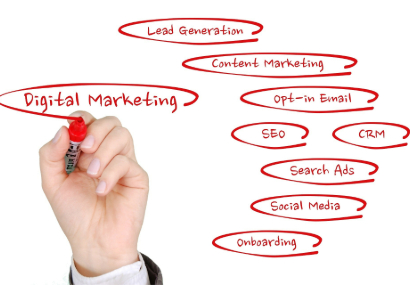

Why Digital Marketing Is Crucial for Startup Success?|Why is digital marketing important for startups?|Why digital marketing is important for any business?|Is marketing important for a startup?| Why startups should outsource digital marketing services?| Why is Digital Marketing Essential for Any Start-Up?| Why is Digital Marketing Essential for Established Companies?| Performance marketing for startups
In today's interconnected world, digital marketing is not just an option for businesses—it's a necessity. Whether you're a start-up trying to build brand awareness or an established company looking to stay relevant, digital marketing offers unparalleled opportunities for growth, engagement, and innovation. This article delves into why digital marketing is crucial for businesses of all sizes and provides insights on how to leverage it effectively.
1. Understanding Digital Marketing
Before diving into the importance, let’s clarify what digital marketing entails. Digital marketing refers to the use of online platforms, tools, and strategies to promote products or services. This includes a wide range of activities such as:
- Search Engine Optimization (SEO): Enhancing your website’s visibility on search engines.
- Content Marketing: Creating valuable content to attract and engage your audience.
- Social Media Marketing: Using platforms like Facebook, Instagram, and LinkedIn to connect with your audience.
- Email Marketing: Sending targeted emails to nurture and convert leads.
- Pay-Per-Click Advertising (PPC): Paying for ads that appear on search engines and social media.
- Affiliate Marketing: Partnering with other businesses to promote your products.
2. Why Digital Marketing is Essential for Start-Ups
2.1 Cost-Effectiveness
For start-ups, budget constraints are often a reality. Digital marketing offers a cost-effective alternative to traditional marketing methods. Social media platforms, email campaigns, and content marketing can be executed with relatively low costs compared to print ads, TV commercials, or radio spots.
2.2 Targeted Reach
Start-ups need to maximize every dollar spent on marketing. Digital marketing allows for highly targeted campaigns. With tools like Facebook Ads or Google Ads, you can define your audience based on demographics, interests, and behaviors, ensuring that your message reaches those most likely to convert.
2.3 Building Brand Awareness
For new businesses, establishing brand awareness is crucial. Digital marketing provides platforms to build your brand from the ground up. Through consistent content creation, engaging social media presence, and strategic SEO, start-ups can build their brand identity and presence in the market.
2.4 Measurable Results
One of the biggest advantages of digital marketing is the ability to measure results accurately. Analytics tools like Google Analytics provide insights into how your campaigns are performing, allowing you to adjust strategies in real-time and ensure that your marketing efforts are yielding the desired results.
2.5 Scalability and Flexibility
Start-ups often need to pivot or scale their strategies quickly. Digital marketing offers the flexibility to adapt campaigns based on performance data. Whether it’s increasing budget on high-performing ads or changing the content strategy, digital marketing can scale alongside your business.
3. Why Digital Marketing is Crucial for Established Companies
3.1 Staying Competitive
Established companies face the challenge of maintaining their market position amid evolving consumer preferences and new competitors. Digital marketing helps companies stay relevant by continuously engaging with their audience and adapting to new trends. For instance, incorporating influencer marketing or exploring new social media platforms can help established companies stay competitive.
3.2 Enhancing Customer Engagement
Digital marketing provides multiple touchpoints for customer interaction. Through social media, email newsletters, and personalized content, established companies can foster deeper connections with their audience. Engaging customers through interactive content and responsive customer service enhances loyalty and strengthens brand relationships.
3.3 Expanding Reach and Audience
Even established companies can benefit from expanding their reach. Digital marketing allows businesses to tap into new markets and demographics. For instance, a company looking to enter international markets can use targeted digital ads and localized content to attract new customers.
3.4 Leveraging Data for Better Decisions
Established companies often have more data at their disposal. Digital marketing tools help analyze this data to make informed decisions. Understanding customer behavior, preferences, and purchase patterns can guide product development, marketing strategies, and customer service improvements.
3.5 Cost Efficiency in Retargeting
Retargeting is a powerful digital marketing strategy that focuses on re-engaging visitors who have previously interacted with your brand but did not convert. This approach is highly cost-effective, as it targets a warm audience with tailored messages, leading to higher conversion rates and better ROI.
4. Key Components of a Successful Digital Marketing Strategy
4.1 SEO and Content Marketing
SEO is foundational for any digital marketing strategy. By optimizing your website for search engines, you improve your visibility and attract organic traffic. Content marketing complements SEO by providing valuable information that addresses your audience’s needs and interests.
4.2 Social Media Marketing
Social media platforms are essential for brand building and customer engagement. Creating a robust social media strategy involves choosing the right platforms, crafting engaging content, and interacting with your audience. Regular updates and targeted ads can drive traffic and build brand loyalty.
4.3 Email Marketing
Email marketing remains a powerful tool for nurturing leads and maintaining customer relationships. Crafting personalized and segmented email campaigns helps in driving conversions and keeping your audience engaged with your brand.
4.4 Paid Advertising
Paid advertising, including PPC and social media ads, can provide immediate results and enhance visibility. It’s important to continuously monitor and optimize these ads based on performance metrics to ensure they are cost-effective and aligned with your marketing goals.
4.5 Analytics and Optimization
Data-driven decision-making is at the heart of digital marketing. Utilize analytics tools to track your campaigns’ performance, understand user behavior, and identify areas for improvement. Regularly optimizing your strategies based on this data will help in achieving better results.
5. Challenges and Considerations
5.1 Staying Updated with Trends
Digital marketing is a dynamic field with ever-evolving trends and technologies. Keeping up with the latest developments and adapting your strategies accordingly is crucial for staying competitive.
5.2 Managing Multichannel Strategies
Coordinating across multiple digital channels can be challenging. Ensuring a cohesive brand message and a unified strategy across various platforms requires careful planning and execution.
5.3 Addressing Privacy Concerns
With increased focus on data privacy, businesses must be transparent about how they collect and use customer data. Compliance with regulations like GDPR and CCPA is essential to maintain trust and avoid legal issues.
5.4 Performance marketing for startups
Performance marketing for startups is a digital advertising approach where costs are directly tied to specific actions or outcomes, such as clicks, leads, or sales. Unlike traditional marketing methods, which often require upfront payments, performance marketing focuses on measurable results and efficiency. For startups, this means they can maximize their marketing budget by paying only for verifiable achievements, allowing for better budget control and the ability to optimize campaigns based on real-time performance data.
6. Conclusion
Digital marketing is not merely a trend but a fundamental aspect of business success in the modern era. For start-ups, it provides a cost-effective way to build brand awareness and engage with potential customers. For established companies, it offers tools to maintain competitiveness, enhance customer engagement, and make data-driven decisions. By understanding and leveraging digital marketing effectively, businesses of all sizes can achieve sustainable growth and stay ahead in an increasingly digital world.
Investing in a well-rounded digital marketing strategy is not just a choice; it’s a necessity for thriving in today’s fast-paced, technology-driven market.
